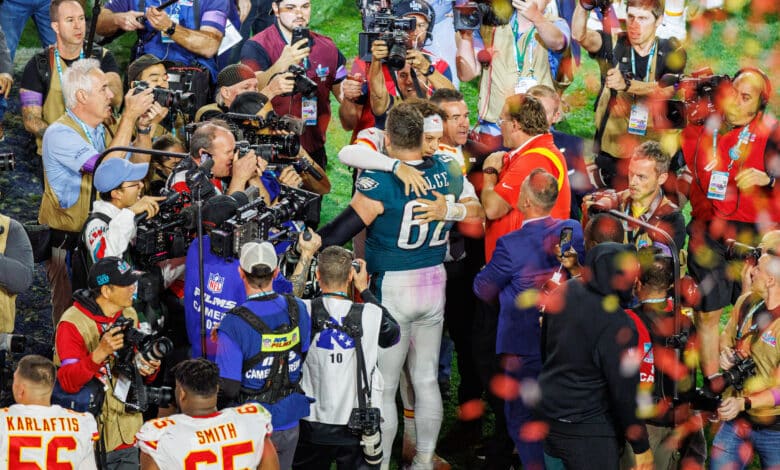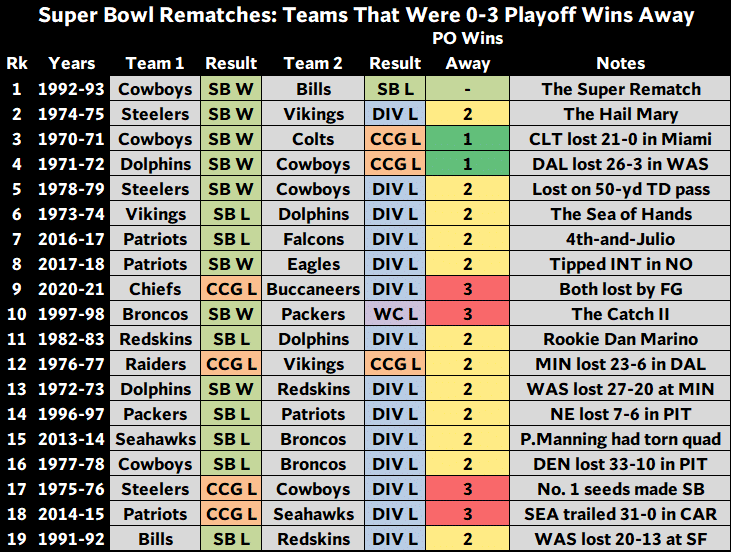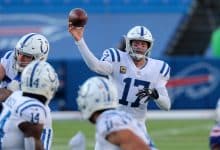
By Scott Kacsmar
Arguably the biggest game of the NFL’s 2023 regular season is happening Monday night when the Kansas City Chiefs (7-2) host the Philadelphia Eagles (8-1) in a Super Bowl rematch of last year’s 38-35 classic. The 35 points scored by the Eagles are the most ever by a losing team in the Super Bowl.
The teams once again are leading their conferences by record and the MVP odds have quarterback Patrick Mahomes slightly ahead of Jalen Hurts. Not only is it a big measuring stick game for both teams, but it is a rarity in that the Eagles and Chiefs are meeting for the third season in a row since 2021 despite playing in different conferences.
This is due to the new scheduling rules to accommodate a 17-game season in 2021, and of course meeting in last year’s Super Bowl helped to make this streak possible. The only other times since the 1970 merger when an AFC team played an NFC team in three straight seasons were Raiders-Vikings (1976-78) and Steelers-Cowboys (1977-79). The AFC team pulled off a 3-0 sweep both times, and the Chiefs are currently up 2-0 vs. Philadelphia.
But will this only be the first of two meetings between the Chiefs and Eagles this year? There have been many seasons where the gut instinct was to pick a Super Bowl rematch, yet it has only happened one time since it became a possibility starting in 1967.
Right before the salary cap era started, the 1992-93 Cowboys and Bills became the only teams to ever meet in back-to-back Super Bowls and Dallas won both games. Even that historic event needed an unprecedented outcome to happen as Buffalo was appearing in its fourth-straight Super Bowl, still the only team to ever do that.
How many NFL seasons have come close to a Super Bowl rematch, what usually goes wrong, and can the Chiefs and Eagles pull this rarity off this year? We look back at history and ahead to Monday night and the playoffs.
What Happens to Defending Conference Champions?
Setting the 2023 Chiefs and Eagles aside with their futures to be determined, we have 112 Super Bowl teams to study going back to 1966. Here is the breakdown of what happened to those 112 teams the following season:
- 34 teams missed the playoffs (30.4%), including a perfect split of 17 Super Bowl winners and 17 Super Bowl losers
- 30 teams lost in the divisional round (26.8%)
- 14 teams lost in the Conference Championship Game (12.5%)
- 12 teams lost in the wild-card round (10.7%)
- 11 teams returned to win the next Super Bowl (9.8%), including 8 repeat champions
- 11 teams returned but lost the next Super Bowl (9.8%), including an 0-6 record for teams attempting a repeat
This means only 22 of the 112 teams (19.6%) returned to the Super Bowl where their record was 11-11. Of the 78 teams that returned to the playoffs, 42 (53.8%) failed to get past the divisional round.
Those are the individual team results. What about the 56 pairings of Super Bowl teams?
There have been 29 seasons where at least one of the two teams failed to make the playoffs so that quickly killed any buzz for a possible rematch in the big game. There have been five instances of both Super Bowl teams missing the playoffs the following year:
- 1987-88 Redskins and Broncos: Washington’s defense fell off in a 7-9 season that was Joe Gibbs’ only losing season in his first tenure, and the Broncos had a slow 1-3 start before finishing 8-8. Denver returned to the Super Bowl in 1989.
- 1998-99 Broncos and Falcons: Hall of Fame quarterback John Elway retired and the star running back on each team (Terrell Davis and Jamal Anderson) were both injured after 2-4 games.
- 2001-02 Patriots and Rams: New England only finished 9-7 and Kurt Warner imploded for the Rams and was replaced by Marc Bulger.
- 2002-03 Buccaneers and Raiders: Brad Johnson and the Tampa Bay offense were no longer supported by a historically dominant defense, and Rich Gannon fell off from his MVP season for the over-the-hill Raiders.
- 2015-16 Broncos and Panthers: Peyton Manning retired for the Broncos, who tried to go with Trevor Siemian at quarterback, and the Panthers had a huge regression on both sides of the ball, going from 15-1 to 6-10.
In cases where a key player retired, it made sense for the team to take a step back the next year like those Denver seasons after Elway and Manning were gone. We also have seen some teams finally reach the top of the mountain before declining to the rest of the pack. The 2012 Ravens did this, sending Ray Lewis to retirement and it was the end of the road in Baltimore for Ed Reed too that year. The 2021 Rams loaded up to win a Super Bowl, then they lost players like Andrew Whitworth (retired), Von Miller, and Odell Beckham Jr. before finishing 5-12 in 2022, the worst record ever for a defending champion.
The Super Bowl loser curse became a thing in the 2000s after 80% of the Super Bowl losers in 1998-2007 failed to make the playoffs the next year. Part of that was the flash-in-the-pan nature of teams back then with the 1998 Falcons, 2000 Giants, 2003 Panthers, and 2006 Bears catching lightning in a bottle to reach the Super Bowl. Injuries also mattered as Donovan McNabb had a sports hernia for the 2005 Eagles, who also endured the Terrell Owens drama that year, and the 2008 Patriots lost Tom Brady on opening day to a torn ACL.
Since 2008, more Super Bowl winners (5) have missed the playoffs than Super Bowl losers (3). In fact, 11 of the last 14 teams to lose the Super Bowl made it back to the playoffs, including a Super Bowl win for the 2018 Patriots a year after losing to the Eagles.
But it is true that the NFL has more parity now in teams reaching the Super Bowl as 15 of the last 22 seasons have seen at least one Super Bowl team fail to make the playoffs. This parity has been one-sided with the NFC generating a new flash-in-the-pan team on a yearly basis while the AFC has been almost exclusively represented by the Patriots, Steelers, teams with Peyton Manning, and lately the Chiefs. The 2013-14 Seahawks are the only NFC team in the last 25 years to have back-to-back Super Bowl appearances.
The Closest Calls to a Super Bowl Rematch in NFL History
There have been 27 seasons where both Super Bowl teams returned to the playoffs. What were the closest calls on a rematch besides the only one we ever had in 1992-93 Dallas vs. Buffalo? We tackle those in this section.
The Dynasties of the 1970s
Believe it or not but the greatest era for getting a Super Bowl rematch should have been the 1970s when so many great teams existed at the same time and were fighting for superiority. We are talking primarily about the Steelers, Cowboys, Dolphins, Rams, Raiders, and Vikings.
Every year from 1971-79 (nine seasons), both Super Bowl teams from the previous season made the playoffs. The longest streak since then has been four seasons. This was despite not having as many wild card berths as there are now as those wouldn’t double until 1990.
Which years had the closest calls?
1970-71 Cowboys vs. Colts: In 1970, the Colts beat the Cowboys in an ugly Super Bowl V matchup. We were one game away from a rematch in 1971, but the Colts were crushed 21-0 in the AFC Championship Game in Miami, a team the Colts beat 14-3 in Week 13. But Miami prevailed as a 1-point favorite to reach its first Super Bowl where it lost to the Cowboys.
1971-72 Dolphins vs Cowboys: A year later, the same thing essentially happened. The Dolphins followed their Super Bowl loss with a perfect, undefeated season. But instead of getting revenge on Dallas, they had to face the Redskins, who crushed Dallas 26-3 in the NFC Championship Game.
1973-74 Dolphins vs. Vikings: A three-peat was not impossible for Miami after an 11-3 season, and it would have been against Minnesota in the Super Bowl again. But the Dolphins lost 28-26 in Oakland in the divisional round in the famous “Sea of Hands” game where the Raiders scored a late touchdown to win the game.
1974-75 Steelers vs. Vikings: It could have been a rematch as 1975 was shaping up nicely for Fran Tarkenton and the 12-2 Vikings. But in the divisional round at home, the Vikings lost 17-14 to Dallas after Roger Staubach threw the most famous Hail Mary ever to Drew Pearson to win the game. The Steelers went on to win their second-straight Super Bowl over Dallas instead.
1978-79 Steelers vs. Cowboys: We could have had a third Super Bowl between these teams in five seasons, but Dallas lost 21-19 to the Rams in the divisional round after Vince Ferragamo threw a 50-yard touchdown to Billy Waddy to send Roger Staubach into retirement. The Cowboys likely would have won against Tampa Bay in the NFC Championship Game, setting up a crucial Super Bowl with Pittsburgh. Instead, the Steelers beat the underdog Rams to win their fourth title in six years.
Between the Sea of Hands and a couple of 50-yard touchdown bombs in the fourth quarter, these were some of the closest calls ever to a Super Bowl rematch. It would be some time until we had another good opportunity.
The 1990s Bills
Buffalo’s historic run to four straight Super Bowls in 1990-93 created great opportunities for Super Bowl rematches. Buffalo never came closer to winning one of those games than the first one against the 1990 Giants in Super Bowl 25, but Scott Norwood missed the game-winning field goal and the Bills lost 20-19.
But coach Bill Parcells left the Giants after that game and they only finished 8-8 in 1991, missing the playoffs. Poor Buffalo ended up running into a super team in the 1991 Redskins, who won 37-24. But that team was really a last hurrah for Washington, and they were only 9-7 in 1992 and lost 20-13 in San Francisco in the divisional round.
We said in the intro that Bills-Cowboys being a Super Bowl rematch took unprecedented outcomes like a team reaching four straight Super Bowls, but we didn’t even mention it took a 32-point comeback in the wild card round for Buffalo to make it in 1992. The Bills were down 35-3 to the Houston Oilers at home with backup quarterback Frank Reich starting for an injured Jim Kelly. He led the greatest playoff comeback in NFL history, and it was the largest comeback in NFL history until the 2022 Vikings erased a 33-point deficit against the Colts last season.
Kelly returned for the AFC title game in Miami and led the Bills back to a third-straight Super Bowl. But Dallas was the hot, young team and Buffalo was a hot mess with 9 turnovers in a 52-17 loss.
The Bills and Cowboys actually met in Week 2 of the 1993 season and Buffalo won 13-10 in a game where running back Emmitt Smith held out for Dallas. He returned, won MVP, and the Cowboys were the No. 1 seed and back on their way to the Super Bowl.
Buffalo had arguably its strongest team since 1990, and the Bills were able to outlast the Raiders at home and beat a Kansas City team in a game where Joe Montana was injured to get to their fourth Super Bowl in a row, setting up our only Super Bowl rematch.
While it looks like a 30-13 blowout win by Dallas on paper, the Bills led 13-6 at halftime. A fumble return touchdown by Dallas in the third quarter changed everything as Dallas ran away with the game from there and Smith was named Super Bowl MVP.
The Bills have not been to a Super Bowl ever since. While Dallas was still great with a title game appearance in 1994 and another Super Bowl win in 1995, the Bills finally saw their streak snapped in the AFC. They finished 7-9 in 1994 and missed the playoffs.
Just to recap, to get the only Super Bowl rematch in NFL history, we needed the Bills to complete a 32-point comeback in a playoff game with their backup quarterback and to reach a fourth-straight Super Bowl in 1993. None of those things have been done since by any team, let alone the same team.
The Salary Cap Era
After Buffalo’s run ended and the salary cap started in 1994, things have been difficult for teams to sustain playoff success.
It has been so rough that one of the examples we’ll float out there of a close call was the 1997-98 Broncos vs. Packers. The Broncos won back-to-back Super Bowls, but a Green Bay three-peat in the NFC was denied in the wild-card round in a loss to the 49ers in a classic shootout between Brett Favre and Steve Young, best remembered for Terrell Owens’ game-winning touchdown catch. It may be remembered better by Green Bay fans for the refs missing a Jerry Rice fumble on that drive first.
But even if the Packers won that game, they may have had a hard time getting past teams like Atlanta and Minnesota, the latter who had a 15-1 record and swept Green Bay that year.
But that was really the closest call for a long time as from 1999-2009 (11 seasons), there was only one season where both Super Bowl teams made the playoffs. That was the 2000 season, and neither the Rams (lost in New Orleans in the wild-card round) nor Titans (lost 24-10 at home to Baltimore in the divisional round) won a playoff game that year.
In fact, when the streak ended in 2009-10 with the Saints and Colts, both of those teams lost in the wild-card round in 2010 too. The Saints lost to a Beastquake by Marshawn Lynch in Seattle, and the Colts lost 17-16 on a field goal by the Jets in the last game Peyton Manning played for Indianapolis. It would have been a longshot for either team to get all the way back to the Super Bowl that year.
Incredibly, the 2010-11 Packers and Steelers also failed to win a playoff game in 2011. The Steelers lost to Tim Tebow in Denver in the wild-card round on the first play of overtime, and the Packers were upset during their 15-1 season by the Giants again at Lambeau Field in a 37-20 stunner.
That means from 1998-2014, there was not a single season where both Super Bowl teams from the previous year won at least one playoff game the next year.
That streak ended in 2014-15 when the Patriots lost the AFC Championship Game in Denver. The Seahawks won a wild-card game in Minnesota before losing convincingly to the Panthers in the divisional round. Of course, even that comes with an asterisk as Seattle won 10-9 after Minnesota kicker Blair Walsh missed a 27-yard field goal to end the game.
Since then, there have only been three seasons that were even in the realm of being a close call:
2016-17 Patriots vs. Falcons: While the Patriots reached back-to-back Super Bowls, the Falcons were a little closer than you may remember in 2017. They beat Sean McVay’s Rams on the road, then were in a 15-10 dogfight with the top-seeded Eagles. It came down to red zone execution and Matt Ryan’s fourth-down pass to Julio Jones was just incomplete as the Eagles escaped. There is no guarantee the Falcons defeat the Vikings and Case Keenum in the NFC Championship Game that year, but this is a sneaky great choice for an almost Super Bowl rematch.
2017-18 Patriots vs. Eagles: Again, the Patriots did their part by returning to a third-straight Super Bowl in the AFC. But the Eagles were trying to work out more playoff magic with Nick Foles taking over for an injured Carson Wentz late in the season again. They got past Chicago in the wild-card round thanks to a double doink missed field goal, then they were close to upsetting the Saints in New Orleans before a dropped pass turned into a late interception in a close loss. Would the Eagles have beaten the Rams on the road in the NFC Championship Game? I don’t know, but they did win there in Week 15 with Foles playing well. This is another sneaky good choice.
2020-21 Chiefs vs. Buccaneers: Our final example involves teams who did not even reach the Super Bowl again. The Buccaneers lost in the divisional round to the Rams in a wild 30-27 game where they came back from 27-3 down to tie it only to see Matthew Stafford beat the blitz with a bomb to Cooper Kupp that set up the winning field goal. The Chiefs blew a 21-3 home lead in the AFC Championship Game to Cincinnati, then lost in overtime.
The last one is not really a good example since neither team reached the Super Bowl and neither team led in the fourth quarter of its playoff loss. But the fact that it’s still probably the 9th-closest example of a Super Bowl rematch is saying something.
Before I started putting this together, I expected to write several times about how a team was just a play or drive away in the Conference Championship Game from achieving the Super Bowl rematch, but shockingly, it’s just never happened that way. In fact, there were only two cases where teams were a single Conference Championship win away from the rematch, and both games were blowout losses. Way more than a drive away. They needed a whole game reset to have a chance.
This makes the NFL uniquely hard as we see rematches all the time in the NBA, including a 4-year run of Warriors vs. Cavaliers in 2015-18, which followed a repeat of Heat vs. Spurs in 2013-14. Even the NHL with its difficult postseason tournament more recently had the Penguins and Red Wings meet for the Stanely Cup in 2008-09.
Before we get into Chiefs-Eagles in 2023, let’s end this section with a table ranking the closest calls to a Super Bowl rematch in NFL history, led by the only one who made it the distance. We included every example, several of which were not mentioned above, where the teams were no more than three combined playoff wins away from the Super Bowl rematch happening:

Will the Eagles and Chiefs Make It Back to Super Bowl 58?
If you wanted to make the argument that the Eagles and Chiefs are both performing at a lower level than they did last year when they were No. 1 seeds with 14-3 records that met in the Super Bowl, then it would be an easy argument to make.
The Eagles did a better job of controlling games and protecting the ball last year, the pass rush was stronger, the secondary was healthier, the running game was more consistent, and the receivers after A.J. Brown like DeVonta Smith and tight end Dallas Goedert were more effective than they have been this season. The Brotherly Shove is still as unstoppable as ever, and Jalen Hurts has not slipped much from last year’s numbers, but the Eagles have played more nail-biters this year and are only just getting into the brutal part of their schedule.
The Chiefs had the No. 1 offense last year, but they are currently 13th in scoring, 8th in yards, and in their last two games, they have been held under 300 yards and did not score a point after halftime – two things that have not happened in Kansas City since 2016. These are not the Chiefs we are used to seeing because the scattered remains at wide receiver are not working out as Patrick Mahomes relies more than ever on Travis Kelce. But to make up for this, the Chiefs are playing better defense than they ever have in the Mahomes era, so the team is still winning. It just looks different, and if the last two games are any indication, the offense is becoming even more dependent on the defense.
But the good news for both teams is that 2023 is a down year for the league, and they are still finding ways to win and currently hold the No. 1 seeds in each conference. With Mahomes and Hurts still leading the MVP race, that means there is no one having that special season that would make you concerned they would get outscored in a big game by a better offense.
Both the Eagles and Chiefs recently played Miami, the speedy No. 1 statistical offense, and they both crushed the Dolphins with their defense. Buffalo and Cincinnati, the rivals of the Chiefs, are struggling in the AFC and are not even locks for the playoffs, and the Chiefs get to host both later this season. The Eagles already beat Dallas and lead that division race, and they get the 49ers at home in Week 13 for a game with huge playoff implications. The 49ers may be the only team that can knock out the Eagles in this NFC.
But as we just observed above, history says someone is likely to crash the party in Super Bowl 58 and deny a rematch. Maybe someone gets injured. Hurts had a shoulder injury in Week 15 last year that threatened to derail things for the Eagles before he returned in time. Maybe Kelce tries to teach Taylor Swift a dance move that goes horribly wrong and tanks the offense for Kansas City. You never know.
Maybe it is finally San Francisco’s year as the 49ers (+500) have the second-highest Super Bowl odds at FanDuel between the Chiefs (+480) and Eagles (+550). Maybe the Ravens stop blowing leads and deliver in January for a change. It could even be a rematch of Super Bowl 47 between the Ravens and 49ers, or a rematch of Super Bowl 54 between the Chiefs and 49ers.
Just not a rematch of Super Bowl 57, because that’s not how the NFL has worked for decades. Why should such an unpredictable season have one of the most predictable endings of all time with a Super Bowl rematch of the No. 1 seeds?
But just like how the Bills-Cowboys was unique and broke precedent in 1992-93, you have to say the Chiefs and Eagles are historic teams too. The Chiefs have hosted the last five AFC Championship Games as Mahomes has yet to play a true road playoff game in his career. The Eagles pulled off an impressive feat of returning to the Super Bowl within five seasons after winning one with a different head coach and quarterback. Nick Sirianni and Hurts are in a great position to control the NFC until these other teams catch up with consistency at those key jobs.
As we learned from before, in over half of these seasons, at least one of the Super Bowl teams from last year is usually irrelevant. At this point last year, the Rams were 3-6 and just lost Cooper Kupp for the season. They were already an afterthought before they lost Matthew Stafford for the season in Week 11.
At least the Chiefs and Eagles can say they are holding onto the No. 1 seeds without even playing their best football yet. That alone should put them in a better position than almost every other pairing of Super Bowl teams in NFL history. The Chiefs are -135 to be the No. 1 seed in the AFC and the Eagles are -140 to be the No. 1 seed in the NFC. If they get home-field advantage again, that is going to make it very hard for this rematch to not happen.
At BetMGM, you can find +1000 odds for an Eagles vs. Chiefs Super Bowl 58 matchup. That’s an implied probability of about 9.1%. If this is something that has only happened once in 56 tries (1.8%), you could argue those odds should be more like +5500 for fairer value.
But these are not your average Super Bowl teams, and they are not trying to get back with Trevor Siemian or Matt Cassel as their quarterbacks. The odds are better than 1.8% for these teams, and they may top 10% if we start seeing stronger play from both, because we know what they are capable of doing. The upcoming schedule should answer all we need to know about Philadelphia’s readiness for a return to the Super Bowl, something the NFC rarely sees now. The Chiefs are eying a fourth Super Bowl in the last five seasons, which was done by Buffalo (four straight) and the Patriots in 2014-18.
When you go to watch the game Monday night, just know you are witnessing history made with these teams, the first time an AFC and NFC team met in three straight seasons in the 32-team era.
And don’t be surprised if there is a fourth meeting on February 11, 2024, in Las Vegas. Maybe one that will have a classic finish where the referee can swallow their whistle on third down this time.
Finally, before you start touting Taylor Swift’s conspiracy theories for this rematch to happen in February, just remember these teams have been building towards this. Do not penalize them for having their stuff together at a time when so much of the NFL is going through a transition period to figure out if they have the right coach and quarterback in the building.
The rest of the league just has to catch up and knock them off the top of the mountain like virtually every other season in the Super Bowl era has except for 1993.



